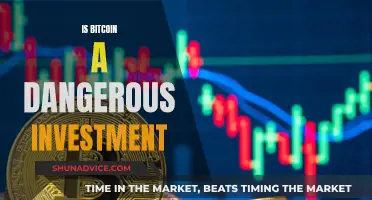
Bitcoin is the oldest cryptocurrency in the market, barely a decade old. Despite its nascency, wealth fund managers believe it is probably the safest bet if you're looking to invest in the crypto market. While cryptocurrencies are inherently volatile, the trust Bitcoin has garnered makes it unlikely to disappear. In this article, we will explore the pros and cons of investing in Bitcoin in India.
| Characteristics | Values |
|---|---|
| Legality in India | Legal |
| Minimum investment | No minimum amount required to buy BTC |
| Best crypto exchange in India | CoinDCX |
| Other crypto exchanges in India | ZebPay, Mudrex, WazirX, CoinSwitch |
| Wallet to store bitcoins | Blockchain wallet (cold or hot) |
| Tax on bitcoin trading in India | 30% tax + 1% tax deducted at source on transactions exceeding Rs 50,000 |
| Risk factors | Volatility, security risks & scams, environmental impact |
What You'll Learn

Bitcoin's extreme volatility
Bitcoins Extreme Volatility
Bitcoin is a highly volatile asset. In its 15 years of existence, it has seen new all-time highs and dramatic drops. Its volatility is due to the speculative nature of the cryptocurrency industry, where investors bet on Bitcoin's price going up or down, causing sudden price surges or plummets.
Bitcoin's volatility is measured by how much its price fluctuates relative to its average price over a period of time. Volatility is important because it indicates the level of risk associated with holding an asset. The more volatile an asset, the riskier it is, and the more people will want to limit their exposure to it.
Bitcoin's volatility has been declining and is expected to continue doing so as the asset class matures and its market cap grows. However, compared to other asset classes, Bitcoin is still more volatile. From 2020 to 2024, Bitcoin was three to four times as volatile as various equity indices.
Bitcoin's volatility can be compared to that of gold. Shortly after the U.S. dollar was de-pegged from gold, gold's price and volatility spiked. Once gold became a recognized asset class and its price settled, volatility declined. Similarly, as Bitcoin matures and its price stabilizes, its volatility is expected to decrease further.
Despite Bitcoin's extreme volatility, investors have historically been well compensated for it. Bitcoin has offered the potential for high returns, and its returns have been disproportionately skewed to the positive side. This is evident in its Sharpe ratio of 0.96 from 2020 to early 2024, indicating that investors have been more than compensated for the risk taken.
The Ultimate Guide to Investing in Bitcoin
You may want to see also

The future of Bitcoin in India
Bitcoin and other cryptocurrencies have been rapidly growing in India despite restrictions from the government and the Reserve Bank of India. According to some estimates, over 100 million Indians own cryptocurrencies, making India the country with the largest number of Bitcoin holders in the world.
In 2020, the Supreme Court overturned the Reserve Bank of India's 2018 order that banned financial institutions from handling crypto transactions. This was a significant step forward for the future of cryptocurrencies in India. However, the Reserve Bank of India still has concerns about cryptocurrencies and their potential threat to financial systems.
In 2021, the government planned to introduce a bill to ban private cryptocurrencies with certain exceptions. The bill, titled 'Cryptocurrency and Regulation of Official Digital Currency Bill, 2021', aimed to promote the underlying blockchain technology and its uses. The government is likely to treat cryptocurrencies as an asset class rather than a currency, which would provide an opportunity for tax returns.
Despite the proposed regulations, the future of Bitcoin in India remains uncertain. While some experts believe that cryptocurrencies are here to stay and that the focus should be on regulating them, others argue that they should be banned. The parliamentary committee on finance has stated that cryptocurrencies cannot be banned, and the next step should be to find ways to regulate them effectively.
The popularity of cryptocurrencies in India, especially among youngsters, has led to a sudden explosion of advertisements from crypto exchange platforms. These platforms have been promoting Bitcoin and other cryptocurrencies as quick money-making opportunities, luring many young investors. However, it is important to remember that Bitcoin is a risky and highly volatile investment. As with any investment, it is crucial to understand the risks involved before deciding to invest.
Spot Bitcoin ETF: A Beginner's Guide to Investing
You may want to see also

How to buy Bitcoin in India
Step 1: Choose a Crypto Exchange
To buy Bitcoin, you need to use a crypto exchange—a platform where buyers and sellers meet to exchange money for coins. There are hundreds of exchanges to choose from, but for beginners, it's best to opt for one that balances ease of use with low fees and high security. Some of the most popular and reputable exchanges in India include ZebPay, CoinDCX, WazirX, and CoinSwitch.
Step 2: Complete the KYC Process and Set Up Your Account
Before you can start trading, you'll need to complete a Know Your Customer (KYC) process. This typically involves submitting your Aadhaar card, PAN card, and other essential documents. You'll also need to link your bank account to your chosen exchange.
Step 3: Decide on a Payment Option
Different exchanges offer different payment options, including bank transfers, net banking, Mobikwik, cryptocurrency wallets, or UPI. Keep in mind that certain funding options may incur higher transaction fees, so be sure to check the fee structure of your chosen exchange.
Step 4: Place Your Order
Once your account is funded, you can place your first order to buy Bitcoin. Depending on the platform, you may be able to purchase it with the click of a button, or you may need to enter Bitcoin's ticker symbol (BTC) and the amount you want to invest. Remember, you don't have to buy a whole Bitcoin; you can invest as little as Rs 100 or Rs 500.
Step 5: Select a Safe Storage Option
Your chosen crypto exchange will likely offer an integrated Bitcoin wallet, or they may recommend a partner platform. However, if you don't feel comfortable leaving your crypto connected to the internet, you can choose to store your Bitcoin in an online or offline wallet of your choice. Just be aware that if you move your crypto off the exchange, you may incur a small withdrawal fee, and there's a risk of losing your private key, permanently locking you out of your wallet.
Strategizing Bitcoin Investment: A Long-Term Guide
You may want to see also

Bitcoin's ESG concerns
Bitcoins ESG Concerns
The environmental, social, and governance (ESG) concerns around Bitcoin are varied. Bitcoin's energy consumption and the resulting pollution are the most well-known and discussed ESG concerns. The process of mining Bitcoin requires a lot of energy, and until recently, most of the mining power was located in far-flung regions of China, where power was cheapest, often coming from old, outdated coal plants. However, in June 2021, China banned Bitcoin mining due to increasing pollution and power shortages.
The high energy consumption of Bitcoin has been criticised by many, including Elon Musk, who reversed Tesla's policy of accepting Bitcoin as payment for its cars, and US Treasury Secretary Janet Yellen, who called it "an extremely inefficient way of conducting transactions".
The greenhouse gas emissions from energy usage and the resulting electronic waste are key environmental risks of Bitcoin. However, according to the Bitcoin Mining Council's Q2 2021 Global Review, 56% of the energy used to power the Bitcoin network is renewable.
The social impact of Bitcoin is uncertain. Investor protection and education are important risks for companies that facilitate direct cryptocurrency investment, and transaction disputes may also pose a risk for companies that accept cryptocurrencies as payment.
Governance is another area of concern. Cryptocurrencies like Bitcoin are decentralized and have no single decision-making body. This lack of a traditional governance structure does not mean the absence of governance, but it presents challenges for boards and investors. The governance of cryptocurrencies is supported and promoted by informal and dynamic communities of software developers, cryptocurrency miners, and other actors.
Overall, while Bitcoin does have some ESG concerns, particularly around energy consumption and the environment, there are also arguments that it is more ESG-friendly than commonly believed.
Strategizing Bitcoin Investments: How Often to Invest?
You may want to see also

Bitcoin's potential as a non-correlated asset
During the COVID-19 pandemic, for example, Bitcoin's price plummeted in tandem with the U.S. stock market as people rushed to sell their financial assets for cash. This increase in correlation was attributed to a short-term liquidity crisis that impacted multiple asset classes. Additionally, the growing adoption of Bitcoin by traditional financial players and its integration into institutional portfolios could lead to increased correlation with other assets over time.
However, Bitcoin has also demonstrated its ability to be a non-correlated asset. For instance, after the 2007-2008 financial crisis, gold, a traditional safe-haven asset, dropped by 30%, while all assets trended towards a correlation of 1 during the liquidity crisis. Eventually, gold decoupled from other assets, and Bitcoin could potentially follow a similar trajectory.
Bitcoin's correlation with other assets is also influenced by its unique characteristics as a decentralised digital currency operating on blockchain technology. Its value is determined by its technology and its relation to the world, setting it apart from traditional investments.
Overall, while Bitcoin has exhibited some correlation with other assets during isolated, short-term events, on a broader timeline, it continues to prove itself as a non-correlated asset.
Is Bitcoin a Safe Investment?
You may want to see also
Frequently asked questions
Yes, it is legal to buy Bitcoin in India.
There is no minimum amount of money required to invest in Bitcoin in India. You can purchase Bitcoin for as little as 100 INR.
Bitcoin is a risky investment due to its high volatility. It is also difficult to determine its true value as it does not generate cash flow or revenue. Additionally, Bitcoin poses a significant risk to the environment due to the energy consumption involved in mining.
Bitcoin is the largest and oldest cryptocurrency in the market. It has the potential to be a non-correlated asset, similar to gold, and can be used as a hedge against inflation. It also offers a medium of transaction without third-party fees or transaction charges.
You can buy Bitcoin in India through a crypto exchange platform such as WazirX, ZebPay, CoinDCX, or CoinSwitch. These platforms allow you to buy, sell, and store Bitcoin.







